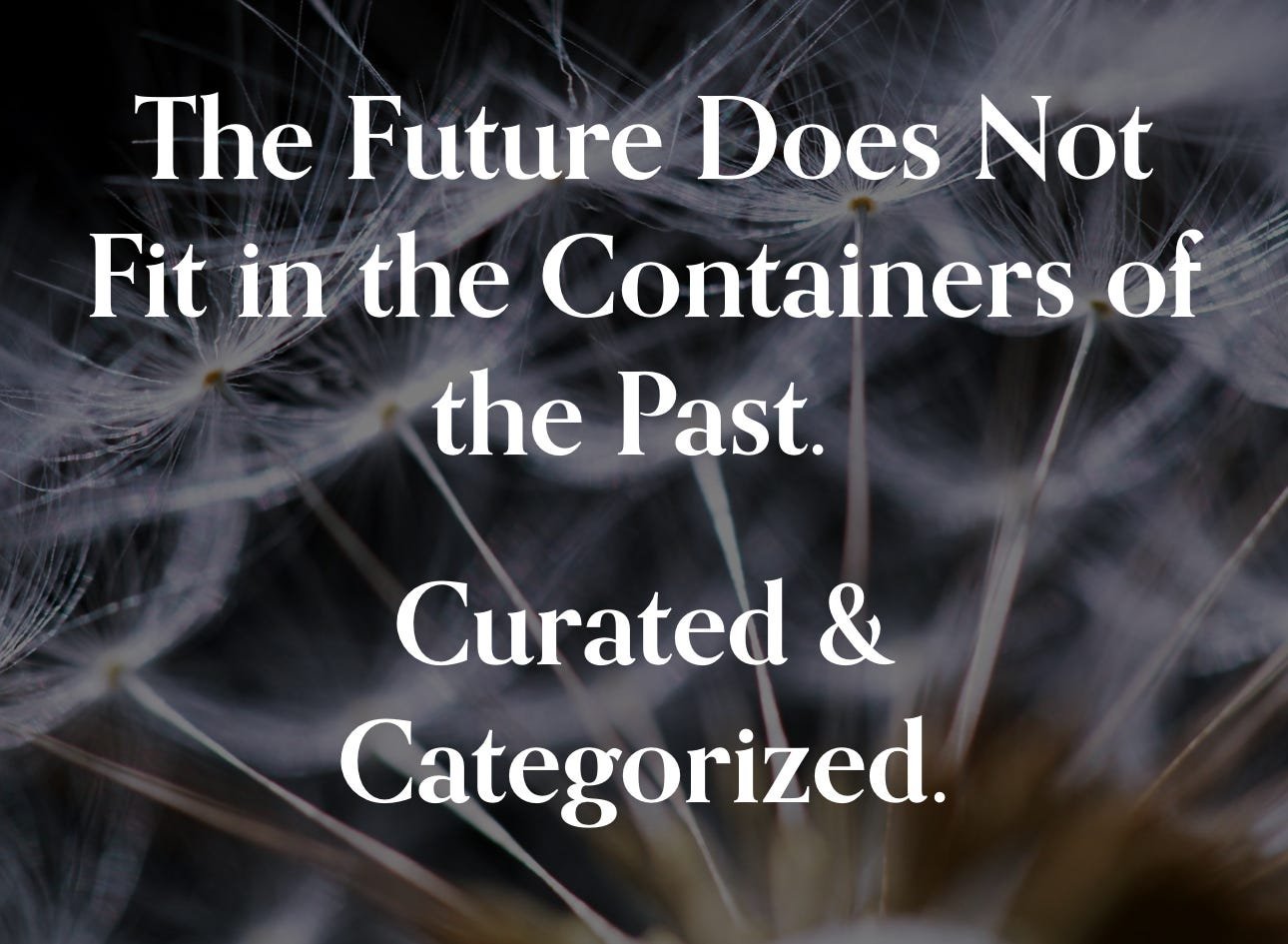The 3 Keys: Collaborative. Calm. Connected.
Image by 9400 using Mid-journey
This is the second post in a six part series on helping every professional adopt “ A Company of One Mindset” to ensure one can thrive in their current companies while ensuring optionality in a transforming world.
The first post built the case of for a “Company of One Mindset” and can be read here.
This second post covers the 3 keys required for a successful company of one which requires collaboration, calmness and connectedness.
These three behaviors are key to thrive in a company of tens of thousands too!
Image by eradaab using Mid-Journey.
Collaborative.
A “Company of One” is a mindset that recognizes that every single individual succeeds only if one is highly collaborative with other people (and soon with AI).
This is true in a large, midsized and small companies.
Collaboration is critical for four reasons.
Complimentary Skill Sets: To get any job done inside an organization or by one self it will require other people to contribute their skills, craft, knowledge and labor to help achieve a goal.
Accessibility: In order to scale one’s talent one needs to plug and play into other other peoples super powers. You want a friendly API to be easy to connect to.
Reputation: When one reaches out for help there is an inclination to reach out to people who are easy to work with. Less the drama and soap opera and deep sighing the more one will find there is demand for one’s skills. It is critical to avoid being labeled “difficult to work with”. People will rather work with “very good and easy to deal with” then “excellent but very difficult.”
Speed: Being collaborative ensures speed. Think of how much friction there is when one is dealing with non-collaborative people. Lots of heat but little light. In the future speed will be even more key.
Image by jakob-anim using Mid-Journey
Connected.
To thrive it is critical to be connected.
Connected to and aware of the latest trends in ones field.
Connected to the best tools and technologies that are available.
Connected to the key folks in one’s industry and craft.
Connected to how one’s work drives and is linked to outcomes.
Think about the people you reach out to in your firm or outside it and you will find that you want your key connections to be “connected”.
And connected is a mindset that any person even if they are operating by themselves can engender.
Invest time in learning and being exposed to the key trends in one’s field and take the time and if necessary use one’s own funds to ensure that one is using the latest tools.
Many of the latest tools are very cheap and so do not wait for a company to get them or give them. It is our job to be on the cutting edge so we are not left on the cutting floor.
Read and listen to the the best people in one’s fields. Everyone is accessible everywhere and often for free via You-Tube, podcasts, X, Tik-Tok, LinkedIn and other platforms. Professionals who are passionate about their craft can access and learn from anyone. Leverage everything the Learning and Development teams in your company provide. These are critical people. But if you need more ask for it or go get it on your own.
Connected to outcomes means focusing on the cool shit versus fixating or describing how one’s colon works. A big risk in a company is to confuse process for product or blame the lack of outcomes on some bureaucracy. Clients and the market place do not give a fig if you live in a constipated firm!
Feed the firm some fiber.
Image by Fossil 75 using Mid-Journey
Calm.
"Freedom is a calm mind."
― Shane Parrish
Think about the co-workers you most cherish.
They are likely to be collaborative.
And they are connected.
But it is also likely that many of them are calm.
Work is drama.
That is a fact that few can argue with.
It is filled with surprises from competition, clients, technology, politics, and a myriad number of forces.
Work is a soap-opera.
Each of us are dramatic players emoting, swooning, falling and resurrecting.
That is human.
But since we are at work and have to deliver results and are not actors or actresses in a soap opera or drama we eventually have to chill and calm down and carry on.
Decisions made under emotional stress tend to often be wrong. So it is best to be calm or seek out people who can help one see clearly and feel calm.
This is true in a company of many but particularly if one is working by oneself since calmness signals confidence.
Calmness means not confusing activity with outcome and not appearing desperate.
Just as banks often do not lend money to the people who most need it the likelihood of being hired when you most need a gig or appear desperate is slim since the buyer wonders what is wrong with us.
So calmness is all.
Net to succeed in a company think like a company of one which is highly collaborative, deeply connected and calm filled.
Adopt a Company of One Mindset.
Today, exactly five years ago on June 30, 2019, I ended a wonderful 37 year full-time working career at a 100,000 plus person company (though I am fortunate to continue to work with it in a different way) and began a new career as a company of one.
During the next few weeks, I plan to share my learnings and insights because I have come to believe that, even if one works at company the scale of a Walmart or Amazon, it behooves everyone to have the mindset of a company of one because such a mindset will a) allow one to perform better at a large company, b) ensure a longer career at any company that one loves and admires, c) maximizes options and d) ensures that one is prepared for potential radical changes in the future of work.
My learnings are informed by my own experience, speaking with and observing the experience of others, working with and visiting over 100 companies around the world in the past five years and deep research involved for my next book Rethinking Work.
A Company of One mindset will allow one to stay longer, perform better and be happier at any company from small to midsized to giant while ensuring that one remains relevant and future proofed should one decide to move on or is at the wrong end of a “right sizing” or “delayering” initiative.
Better performance and longer tenure at your current firm while ensuring you are future proofing your career and maximizing your options.
Future posts will cover everything from what, how, when and much more but today is about the “Why a company of one mindset” will be critical.
Why A Company of One Mindset.
It is projected that in 2027, 86.5 million people will be freelancing in the United States making 50.1 percent of the population.
A combination of five forces is driving this re-configuring of the workforce:
Aging: In the United States 10,000 people turn 65 every day and many of this group continue to work because they need to so as to make ends meet, or want to for reasons of identity, community, purpose and/or growth but cannot or do not want to work full time for a company. Many firms which are finding it difficult to access certain skills and experience are now becoming far more flexible in their approaches to retaining their seasoned workforce on a part-time basis.
New Mindsets: 76 percent of Gen-Z want to work for themselves and 66% of Gen-Z who hold a full-time job also have a side-gig or side-hustle. In addition, Covid-19 have many people re-framing the question of how life could fit into work ? with how does work fit into a life?
Remote/Hybrid Work: Remote-Hybrid work provides the flexibility to work anywhere for anybody which can enhance opportunities to get work while moving to locations that cost less which allows for more career options.
The Technology powered Gig-Economy: New marketplaces from Fiverr and UpWork to find talent and work, AWS and Open-AI to access technology, Etsy and Shopify to sell and connect to marketplaces, Tik-Tok and Meta to connect and brand, combined with companies need to remain agile is driving more talent and firms to a plug and play workplace.
AI and Blockchain: While AI may not lead to fewer jobs it is going to change the nature of most if not all jobs and the half-life of skills are going to decay considerably faster. Blockchain while out of favor will eventually be seen to be essential to trust in an AI world and will enable more ownership and equity for individuals. Most importantly many of these technologies are now providing super-computing power to everybody who cares to learn, allowing individuals to get all the benefits of scaled companies.
Whether it is finding work post-full time career, working a side-hustle or passion project to make ends meet, building an expertise, creating an off-ramp from a full time job, or filling the gaps between full-time employment at firms which are often trigger-happy in adding and removing talent from their payrolls, the smart professional prepares to be a company of one.
This includes everybody including the CEO’s, EVP’s, SVP’s and not just mid and entry level executives.
a) Your current job is a gig job: Companies are creating internal marketplaces where opportunities can be identified and applied for and teams of experts can form and dissolve around projects like consulting firms and the entertainment industry have long done. This will make leadership evolve from zone of control to zone of influence. And tenure will grow less important while relevant skills and ability to incorporate new ones will grow more important.
b) Managing is not enough: In an age of “de-bossification” increasingly people will ask senior folks what they actually do, make or build which means enhancing ones craft and skills and relevance. Allocating, delegating and monitoring will grow less important.
c) Knowledge is fungible: AI is making knowledge free and anybody who believes years of expertise are going to be a moat will be surprised if one is not building new skills and new expertise.
As a result, for an individual to thrive in a company they will need to learn how to operate as a company of one by being “up to tomorrow” and “market competitive and relevant”.
Every one must become a super person.
A true power of one.
The combined power of the Avengers is because each of the Avengers is powerful on their own and not just because they learn to work as one.
What this series of posts will cover.
a) Why a company of one is not about one person or an individual focus but is highly dependent on others and on team work. Why collaboration, reputation and connectedness are key.
b) How to future proof your career and take charge of its navigation with a company of one mindset.
c) The challenges, risks and surprises as well as the fun, flexibility and financial upside a company of one mindset can enable.
d) The steps one can take to become a company of one in a way that is transparent, aligned and supported by your large firm or if you find yourself without a job.
e) Why smart companies and leaders of companies of all sizes but particularly large ones will increasingly encourage a company of one mindset to remain competitive, ensure agility and retain talent. A company of one mindset is great for a company of a million!
Rishad Tobaccowala leverages forty years of global experience across dozens of industries to help leaders and companies thrive in transformative times.
Different.
Here are a simple set of three exercises that can be done by anyone, anywhere, and at anytime but will likely leave you seeing, thinking and feeling differently.
1. Making a difference.
At the end of every day we might want to ask ourselves:
How are we different today then yesterday?
Did we make a difference to anybody or anything?
What would we have done differently?
The first question is about our growth.
Did we grow today so we are different than yesterday?
The second question is about our impact.
Did we have an effect on somebody or something today so they came away better or different?
The third is about improvement.
What did we learn that make us better tomorrow?
If we ask these questions to ourselves every day ( or every week or every month) it allows us to re-invigorate ourselves even at the end of tough days and in some cases signal we need to change our jobs, relationships or lives if the answers constantly indicate low growth, or limited impact or little learning.
Try the exercise and you may find it eye-opening.
2. What made a difference.
We are a sum of the decisions we made, the people we met, the things that happened to us and the chances we took.
In most lives just a handful of decisions, people, events and chances have made all the difference.
Understanding these are a key to a life.
Try answering these:
What 3 key decisions in your life have made all the difference? ( eg. a partner, a job, a decision to leave a place or person)
What 3 people have shaped your life and/or career?
What 3 events good or bad have shaped you ?( eg. health issues, financial windfall, accidents)
What are the 3 biggest chances you took that have determined where you are ? ( eg. risks, betting on people, career re-inventions, moving locations)
In life a handful of decision, events and people determine where you end up.
Often though our lives are changed by other peoples decisions to hire us, help us, partner with us and we need to keep in mind that we have less control often then we might think.
In fact the two biggest drivers of a life are two draws of the lottery which we have no control over.
These are a) who we are born to and b) what country we are born in.
Winning the genetic lottery is often greater than any financial lottery.
One of the benefits of the “what made a difference” exercise is that when we ask others for their key 3 decisions, people, events or chances, we tend to form deeper connections and catalyze more meaningful conversations.
3. A different us.
What differentiates us?
One of the most interesting thing is to see people conflate themselves with their trappings.
If you are a senior person in a company is it you or your role, the company reputation or the money you control that people are admiring and genuflecting too?
So many people are shocked that when they leave or lose their position that they are no longer as relevant, sought after, pandered or curtsied to.
There is us the person.
And then there is us the objectified person empowered by another power source ( a company, a budget, a role) that we borrow from.
Important to remember the differences and to realize what will remain that is us after the role or job or position end.
It is a difference that matters a lot.
What makes you different that is uniquely you?
It is usually a combination of a special niche/skill, a voice and true stories that will alway be yours.
To discover yours try this exercise…
Expiration Date.
Image by David Rojkowski using Leica iPhone de Lux.
The most important expiration dates are not those on food, subscriptions, insurance policies or medicine.
These dates are known.
Its the expiration dates that are unknown that matter the most.
Career Expiration.
‘Every career has a midnight hour. The smart people leave at five to twelve.’
This piece of advice by my friend Sanjay Khosla who ran many large companies over his career really resonated.
Regardless of how good we are, how senior a role we inhabit or how irreplaceable one thinks one is, every career comes to an end.
All is well and then suddenly we find ourselves at midnight hour and the carriage of a career turns into a pumpkin.
The key is to leave before the midnight hour.
This ensures that one avoids being shown the door or shuffled into a reduced role .
The difference between early and late is significant because those who over stay often turn bitter or lose the community or connection that come from colleagues because one has left under a cloud.
These midnight hours occur not just at the end of a career but all through a career.
And they can be felt.
Be particularly wary when one or some combination of the following changes happen:
a) a change in management, b) an acquisition or take-over, c) a sudden change in financial results or d) a shift in technology which creates a strategic review.
When one instinctively feels a change in the force one must pay a lot of attention and ask some combination of the following four questions:
a) How to adapt to the new management?
b) How to adjust to the new culture and power shifts of an acquisition or sale?
c) How to re-think ones skills, approaches and role in the shifts that follow a change in financial result?
d) How to reinvent, learn and change to align with new technology?
If one does not adapt or re-invent or one feels that one cannot work under the new changes then be prepared to find one on the wrong side of the midnight hour and it is better to exit with grace.
Companies do not adapt to employees.
Employees have to adapt to the new realities.
If one is not willing to adapt then get ready to walk.
There is one other time when the midnight hour occurs and this is when one stops growing in a job.
The day one stops growing it means one’s career has started dying and the midnight hour has arrived.
Image by Pepitobobito using MidJourney
Financial Expiration.
The underlying basis of much financial planning is based on three unknown expirations:
a) When will you retire?
This number is shifting to much older for most people either because we are living longer, or in some countries pension payments are being pushed out to later years, or because the cost of living has risen forcing one to work longer.
b) When will you stop earning income?
One can continue to make an income after one leaves a full time job though it may be smaller and more variable till one day it stops. Many financial models fail to take this into account.
c) When will you die?
This number is the big unknown but in most countries it is later and later and something that people have not thought about is how a combination of AI and Biotechnology could significantly increase life expectancy due to breakthroughs in medicine.
It is fascinating to understand how many retirement calculations are based on assumptions that may not make sense. For instance the famous 4% rule that one can draw down four percent of ones assets and not run out of money is based on retiring at 65, having no income and living to 95. Even the person who came up with model believes the draw down is too low.
Similarly annuities which pay a fixed sum for the rest of one’s life is a bet by you that you will outlive the calculations of the actuaries at the Insurance companies. And since they have not factored in the impact of AI and Biotech yet it might be a good bet!
Image by Yiplingli42 using Midjourney.
Life Expiration.
“The Meaning of Life is that it Ends”
Franz Kafka’s quote above explains why living forever even it it was possible might make life less special since if there was no loss, no last things, no ticking clock, would any day, anything or any moment be particularly special?
If one knew how many years one had left would we not live very differently than we do today?
Anyone given a bad health diagnosis usually changes the way they live because they become particularly aware of time.
But most of us can determine the time we have left if we want to.
Globally life expectancy is 73 years and in the US it is 78 years.
So assume 75 years of healthy life.
Subtract your age from 75 and multiply it by 365 days and that is what is left.
Most people are surprised how few they are.
Someone at 55 has just over 7000 days left.
At 65 its a little over 3500…
Keep that in mind next time someone does not take your time seriously.
All Free. All on One Page. All Yours.
This is the 200th edition of “The Future Does Not Fit in the Containers of the Past.”
Over the course of 200 Sundays in a row (nearly four years) 250,000 words of writing (the equivalent of five books) accompanied by the work of a talented painter, sculptor, photographer have been published at rishad.substack.com.
The writing has attempted to be bohemian, shifting across a range of subjects in the belief that in an age of “full-stack leaders” and “vertically or horizontally integrated business models” there may be space for some full spectrum thinking and writing that combines strategy and poetry, technology and art, change and what does not change, roots and wings, business goals and personal ambition, and the many other dualities and complexities that cannot be simplified into a tweet or a silver-bullet solution.
The writing has kept away from the news, politics and the memes of the moment and therefore has stayed evergreen. A piece from four years ago is probably as relevant as it is today.
Finally, everything has been written by one human, remained algorithm free and completely non-monetized with no advertising sales, subscription fees, affiliate marketing or data harvesting.
Regardless, every post has been written, edited and honed with great care ( 3 to 4 hours of writing each week distilling half a century of learning for a six minute piece) since it needs to reward you the reader for your most valuable asset.
Time.
Today nearly 30,000 people spend six minutes a week reading this thought-letter.
That is 180,000 minutes or 3000 hours of time every week.
For the ROI hungry…I write 3 hours a week and get 3000 hours of attention a week which is an ROI of 1000…
It is not just the time but the goodwill generated too.
Thank you reader.
And here is another thank you:
A One Page Distillation.
As some of you may be aware at the request of many readers who like to revisit certain pieces to use for their work or forward to others ( bosses, colleagues, children) I have created a single page where the best pieces and have organized them into a dozen areas for easy access and reference ( much faster than any chatbot or search engine which I have tried to program).
Here is where you can find the one page ( please book mark or note the address as it is a hidden page on my website):
https://rishadtobaccowala.com/100
These 12 different subject areas include those helpful for work such as:
a) Future Thinking and Strategy
b) Managing Change so it Sucks Less
c) Upgrading our Mental Operating System
d) Building Great Cultures
But also sections helpful for the individual such as:
a) Enhancing Effectiveness
b) Selling Better
c) Managing Careers
Or pieces about life, living, losing, love, literary pursuits, philosophy, poetry and joy and can be found in the following sections:
a) Personal Growth
b) Wisdom
All the writing is not only free but it can be sampled, copied, used, fed into transformers or leveraged in anyway the reader wants without any royalty or fee or even attribution.
Because the joy I get from writing and giving is all the getting that is needed.
Thank you again for supporting 200 weeks of writing with your time.















